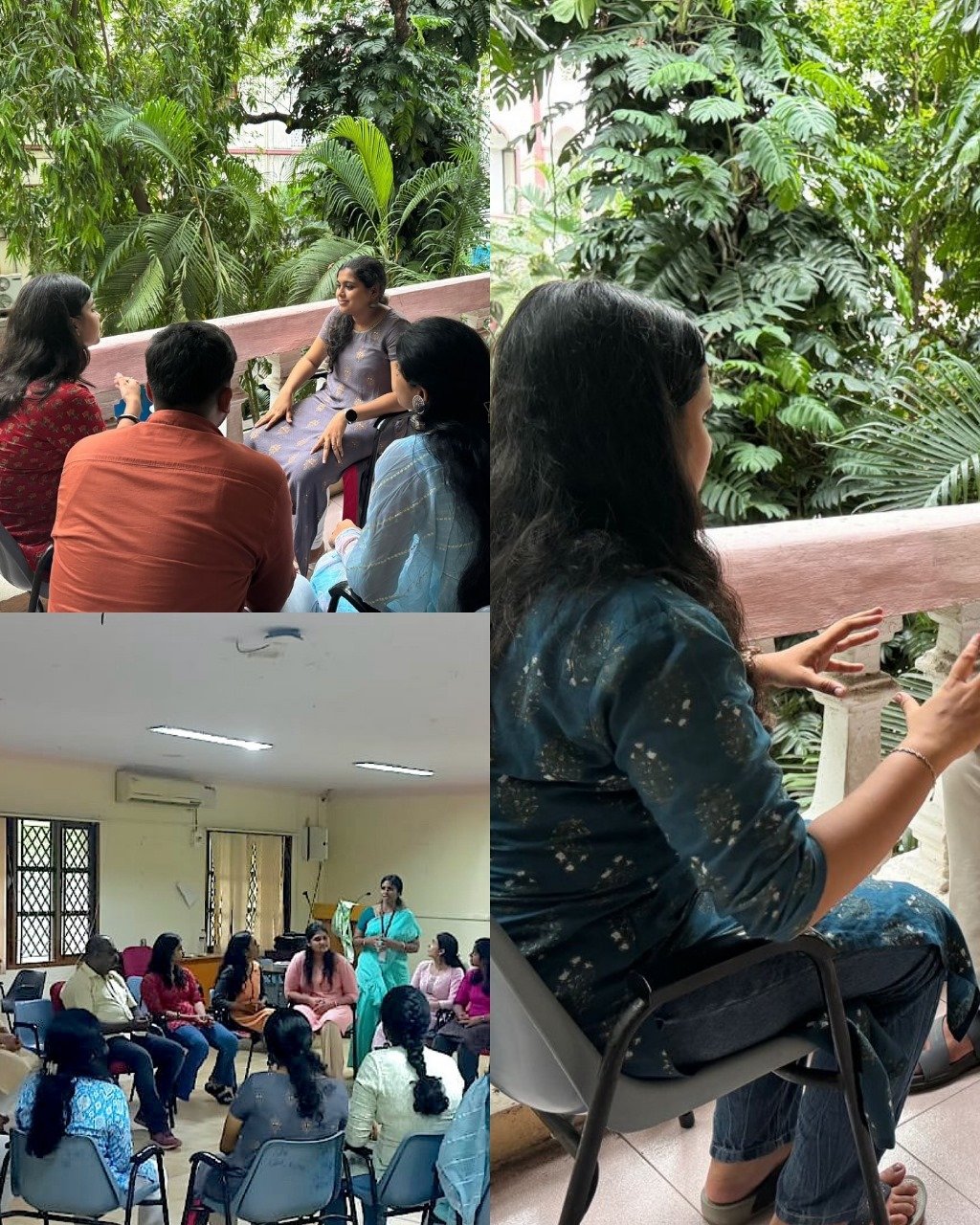Various Themes We Cover
Counselling and Psychotherapy
For Institutes
OBT Training for Corporates
OBT training for Corporates
Achieving Work-Life Harmony
Course Overview: Maintaining a harmonious balance between professional responsibilities and personal life is crucial for sustained productivity and well-being. This training provides insights into achieving equilibrium where career demands and personal needs are effectively managed.
Key Outcomes:
- Strategies for prioritizing work and personal commitments
- Understanding factors impacting personal balance
- Techniques for managing stress and its effects
- Developing communication skills and fostering a positive outlook
Mastering Emotional Intelligence

Course Overview: Emotional intelligence (EI) involves understanding and managing your emotions and those of others. This training equips you with the skills to make rational decisions, enhance professional relationships, and react constructively in various situations.
Key Outcomes:
- Identifying and managing primary emotions such as anger, fear, and sadness
- Recognizing the impact of emotions on workplace interactions
- Developing skills for effective emotional management
- Addressing and resolving emotional challenges
Stress Management Strategies

Course Overview: Stress management involves utilizing techniques to mitigate the adverse effects of stress on physical, mental, and emotional health. This training focuses on identifying stressors and implementing strategies to maintain well-being in a high-pressure work environment.
Key Outcomes:
- Understanding the nature and impact of stress
- Applying research-based coping strategies and relaxation techniques
- Developing a personalized stress management plan
- Enhancing overall quality of life and work performance
Conflict Resolution Skills

Course Overview: Effective conflict resolution skills are essential for navigating and resolving disagreements constructively. This training helps participants handle conflicts professionally and collaboratively, fostering a more harmonious work environment.
Key Outcomes:
- Identifying and addressing conflicts to build better relationships
- Clarifying goals and objectives during disputes
- Gaining insights into diverse perspectives
- Enhancing negotiation and resolution skills
Leadership and Communication Excellence

Course Overview: Effective leadership requires a blend of communication, motivation, and strategic thinking. This training develops key leadership skills to guide and inspire teams toward achieving organizational goals.
Key Outcomes:
- Improving empathetic and positive communication with team members
- Building creative problem-solving abilities
- Developing strategic vision and problem-solving skills
- Mastering time management and team assessment techniques
Setting Effective Personal Boundaries

Course Overview: Establishing clear personal boundaries is essential for maintaining healthy professional relationships and preventing conflicts. This training focuses on setting and communicating boundaries to enhance personal and professional growth.
Key Outcomes:
- Understanding the importance of personal boundaries
- Recognizing the risks of inadequate boundaries
- Assessing and setting personal boundaries for growth
- Developing skills to maintain healthy relationships
Leveraging Nonverbal Communication

Course Overview: Nonverbal communication encompasses body language, facial expressions, and tone of voice, which play a crucial role in effective interaction. This training focuses on mastering body language to enhance communication and build stronger relationships.
Key Outcomes:
- Understanding the significance of nonverbal communication
- Learning various forms of body language through practical exercises
- Interpreting others' feelings via nonverbal cues
Demonstrating confidence through effective body language
Cognitive Therapies Training: REBT and CBT

Course Overview: Cognitive therapies, including Rational Emotive Behavior Therapy (REBT) and Cognitive Behavioral Therapy (CBT), focus on transforming thought processes to improve emotional and behavioral outcomes. This training offers insights into correcting cognitive distortions and enhancing personal and client well-being.
Key Outcomes:
- REBT (Rational Emotive Behavior Therapy):
- Introduction and historical context
- Differentiating rational and irrational beliefs
- Utilizing the ABC model for diagnosis
- CBT (Cognitive Behavioral Therapy):
- Introduction and historical context
- Identifying negative automatic thoughts and cognitive distortions
- Implementing cognitive restructuring and therapeutic techniques
Mindfulness Training

Course Overview: Mindfulness involves cultivating awareness and acceptance to manage stress and improve emotional well-being. This training provides practical exercises to enhance focus, reduce stress, and promote overall mental health.
Key Outcomes:
- Practicing mindfulness to stay present and focused
- Engaging in live training sessions and exercises
- Reducing stress and harmful thought patterns
- Enhancing emotional well-being and resilience
Group Dynamics and Team Management
Course Overview: Effective group dynamics and team management are essential for fostering collaboration and productivity. This training focuses on understanding and improving team interactions to create a positive and efficient work environment.
Key Outcomes:
- Analyzing behavioral relationships within teams
- Addressing and mitigating negative group dynamics
- Developing strategies for effective communication and teamwork
- Fostering a productive and supportive work environment

Proposed Themes for Schools
Work-Life Balance

Course Description:
Balancing professional and personal life is crucial for maintaining overall well-being. Work-life balance involves finding an equilibrium between career responsibilities and personal time. Common issues affecting this balance include excessive workload and poor time management.
Course Outcomes:
- Prioritize Effectively: Learn strategies to balance work and personal life.
- Understand Factors: Explore the elements affecting personal balance.
- Address Stress: Techniques to manage and mitigate stress.
- Develop Communication Skills: Enhance communication and foster a positive outlook.
Emotion Management

Course Description:
Emotional management equips individuals to handle emotions constructively, benefiting career performance and personal relationships.
Course Outcomes:
- Identify Emotions: Understand and manage primary emotions like anger, fear, and sadness.
- Awareness of Consequences: Recognize emotional impacts in relationships and the workplace.
- Learn Management Skills: Techniques for handling emotions such as anger and fear.
Address Emotional Issues: Identify and address personal emotional challenges.
Conflict Resolution

Course Description:
Conflict resolution skills prevent disagreements from escalating and facilitate collaborative solutions. These skills improve both professional and personal interactions.
Course Outcomes:
- Identify Conflicts: Learn to recognize and address conflicts effectively.
- Goal Setting Clarity: Achieve clarity in setting and pursuing goals.
- Gain Insights: Understand different perspectives.
Negotiate Better: Develop effective negotiation skills.
Leadership and Communication Skills

Course Description:
Effective leadership involves guiding and motivating teams. Key skills include delegation, inspiration, and clear communication.
Course Outcomes:
- Improve Communication: Enhance communication with empathy and positivity.
- Creative Problem-Solving: Build skills for creative solutions.
- Visionary Problem-Solving: Develop problem-solving with a clear vision.
Time Management: Master time management and assess team strengths.
Setting Healthy Personal Boundaries in Relationships

Course Description:
Healthy boundaries are essential for balanced relationships, reducing conflict and setting realistic expectations.
Course Outcomes:
- Importance of Boundaries: Understand why setting personal boundaries is crucial.
- Risks of Poor Boundaries: Recognize the dangers of not establishing boundaries.
- Evaluate Boundaries: Assess and set your own boundaries.
- Personal Growth: Learn techniques for setting boundaries to promote growth.
Understanding Family Dynamics and Their Functioning

Course Description:
Family dynamics influence interactions and perceptions. Understanding these dynamics impacts behavior and work relationships.
Outcomes:
- Self-Awareness: Gain insights into your family dynamics.
- Behavior and Emotions: Understand the impact of family interactions on behavior and emotions.
- Family Dysfunction: Learn about dysfunction and its effects.
- Communication Styles: Identify your communication and conflict management styles.

Understanding Others Through Nonverbal Communication
Course Description:
Nonverbal communication—such as gestures and facial expressions—conveys a significant portion of meaning. This course helps in reading and utilizing body language to enhance relationships.
Course Outcomes:
- Significance of Body Language: Understand the importance of nonverbal communication.
- Types of Body Language: Learn various types through practical exercises.
- Feelings Interpretation: Recognize and interpret feelings through nonverbal cues.
Demonstrate Confidence: Show confidence in both personal and professional settings.
Parenting Skills

Course Description:
Effective parenting influences a child’s development and overall health. This course provides strategies to enhance parenting practices for better child outcomes.
Course Outcomes:
- Parenting Styles: Understand different family structures and parenting styles.
- Promote Health: Foster the emotional and physical health of children.
- Optimize Growth: Maximize a child's growth potential.
- Set Boundaries: Establish realistic boundaries for emotional development.
Training in Mindfulness

Course Description:
Mindfulness involves awareness and acceptance of the present moment. This training focuses on improving mindfulness to reduce stress and enhance emotional well-being.
Course Outcomes:
- Present-Moment Awareness: Enhance awareness throughout the day.
- Training and Exercises: Participate in live sessions and exercises.
- Reduce Stress: Lower stress, manage thoughts, and improve emotional health.
Understanding Child Growth

Course Description:
Early childhood experiences shape brain development and impact future learning and health. This course offers insights into supporting healthy development from an early age.
Course Outcomes:
- Early Development: Understand early childhood development and its effects.
- Child Care Insights: Gain practical insights into effective child care.
Parental Strategies: Develop strategies for promoting emotional and physical growth.
Training in Counselling and Psychotherapy
Counselling Skills (Basic)

Course Description:
Counselling Skills Basic introduces students to the fundamental elements of counselling and psychotherapy. The purposes and goals of the counselling and development of the therapeutic relationship are covered in specific skills such as active listening, empathy, and reflection of feeling and content.
A core component of this course is to introduce the participants to the hands-on supervised practice of the specific skills taught. Students will be given the maximum opportunity to develop these skills in a safe and supportive learning environment. The objectives of this course are for students to master basic counseling skills, build intermediate counselling skills in preparation for supervised clinical experience, and become familiar with advanced skills that would further their development.
Course Structure:
- History of counselling and its scope and principles
- Conceptualizing client problems
- Stages of the counseling relationship
- Listening Skills (Attending, Bonding, Empathy)
- Observation Skill (Verbal and Non Verbal communication)
- Interview Techniques and Questioning Skills
- Case study and management
Time duration: 40 Hours
Supervised practice sessions: 15 Hours
Training in Psychotherapies

Course Description:
Psychotherapy refers to techniques and interventions, that help people change unhelpful behaviors, thoughts, and emotions that cause emotional disturbances or distress. It is an umbrella term that describes treating mental distress and some clinical mental conditions through verbal and psychological techniques. This unique module teaches you how to use these interventions and techniques along with counselling to deal with emotions such as Anger, Fear, Trauma, Phobias, Grief, and the like and help people to alleviate such emotional disturbances.
Course Structure:
- History of Psychotherapy
- Types of Psychotherapy
- Therapeutic techniques
- Gestalt therapy (Empty chair technique)
- Systematic Desensitization
- Visual Kinesthetic Dissociation
- Exposure therapy
- Focusing therapy
- New Behaviour Generator
- Anchoring
- Introduction to couple counseling
Time duration: 40 Hours
Supervised practice sessions: 20 Hours
Counselling Skills (Advanced)

Course Description:
The counselling skills advanced module will teach the students deeper insights into counselling such as how to diagnose a client and what therapeutic interventions to apply. It also gives them a deeper knowledge of the theoretical understandings of Mental disorders, and types of counselling and most importantly make them aware, of when to use therapeutic interventions in counselling and when should a person be referred to a clinical psychologist or a psychiatrist for medical assistance.
Course Structure:
- Diagnosing skills
- Pacing and Mirroring skills
- Personalizing and Reframing
- Goal setting and termination
- Introduction to Clinical Psychology
- Different types of counselling
- Using psychotherapies in counselling sessions
Time duration: 40 Hours
Supervised practice sessions: 20 Hours
Training in Cognitive therapies (REBT, CBT)

Course Description:
Cognitive Psychology is the science of how we think. It concerns our inner mental processes such as attention, perception, memory, action planning, and language. Each component is vital in forming who we are and how we see the world and others and derive meaning from them. If our thoughts are distorted and our perceptions blurred, then we get emotionally and behaviorally disturbed. This course helps the students understand their thought processes and those of their clients and teaches them the skills to correct thought distortions in them and their clients. Doing so empowers them to improve their outlook on themselves, their relationships, and the world that surrounds them and their clients.
- Rational Emotive Behaviour Therapy (REBT of Albert Ellis)
- Introduction and history of REBT
- Understanding rational and irrational beliefs
- Irrational demands
- Irrational conclusions
- Primary, Secondary, and Meta emotions and their impact on cognition
- ABC Model of Diagnosing
- Cognitive Behaviour (CBT of Aaron Beck)
- Introduction and history of CBT
- Negative Automatic Thoughts
- Cognitive Distortions
- Cognitive Restructuring
- Therapeutic Technique
Time duration: 40 Hours
Supervised practice sessions: 20 Hours
Workshops:
Deep Dive into Therapy Techniques: Explore innovative counselling methodologies and therapy techniques to enrich your practice.
Personal Growth Through Self-Discovery: Learn how to harness self-reflection and personal experiences to enhance your counselling skills.
Coaching, Personal Guidance, and Counselling: Receive personalized support to help you grow both personally and professionally.








